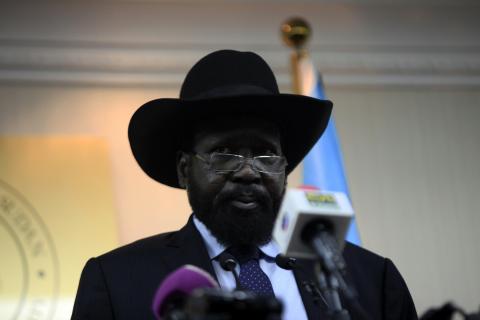Advertisement
South Sudan Accuses Rebels Of Massacring 127 Hospital Patients
JUBA (Reuters) - The South Sudanese government has accused rebel troops of committing atrocities against civilians by killing 127 hospital patients in the town of Bor last month.
The United Nations says thousands of people have been killed in more than a month of clashes pitting troops loyal to President Salva Kiir against rebels supporting Riek Machar, who was sacked as vice president in July.
Officials said the killings occurred on December 19 when Peter Gadet, the army commander in Bor, pledged loyalty to Machar. Bor, which has seen some of the worst fighting since the rebellion started, was only retaken by the government last Saturday.
"They went into the hospital and slaughtered all 127 patients," Ateny Wek Ateny, the president's spokesman, told a news conference.
The rebels rejected the accusation and instead accused the government of massacring civilians in the capital, Juba, and of flattening the oil-producing Unity state's capital of Bentiu when they seized it back from the rebels earlier this month.
"That is a complete lie... We don't target civilians and on the contrary it is the government that targets its own civilians starting with the massacre in Juba," Lul Ruai Koang, a rebel military spokesman, told Reuters by phone from the Kenyan capital.
Officials of the United Nations humanitarian mission to the country were not immediately available to comment.
The army regained Bor with the backing of Ugandan troops deployed there.
Initially sparked off by a political row, battle lines have increasingly followed ethnic lines with Kiir's Dinka battling Machar's Nuer.
Kiir and Machar declined to sign a ceasefire agreement in Ethiopia due to disagreements over the fate of 11 detainees held by authorities in Juba and the involvement of the foreign troops.
Rebels insist the detainees be freed before a deal can be signed while the government maintains that they will only be released when the due process of law has been followed.
A summit of the heads of state of the regional grouping of Inter-Governmental Authority on Development (IGAD), which initiated the Addis Ababa talks, was postponed from Thursday.
A statement from the South Sudanese president's office said the IGAD meeting that was scheduled for Juba would now be held alongside the African Union summit in Addis Ababa starting January 28.
(Additional reporting and writing by Duncan Miriri in Nairobi; Editing by Sonya Hepinstall)



















Add new comment